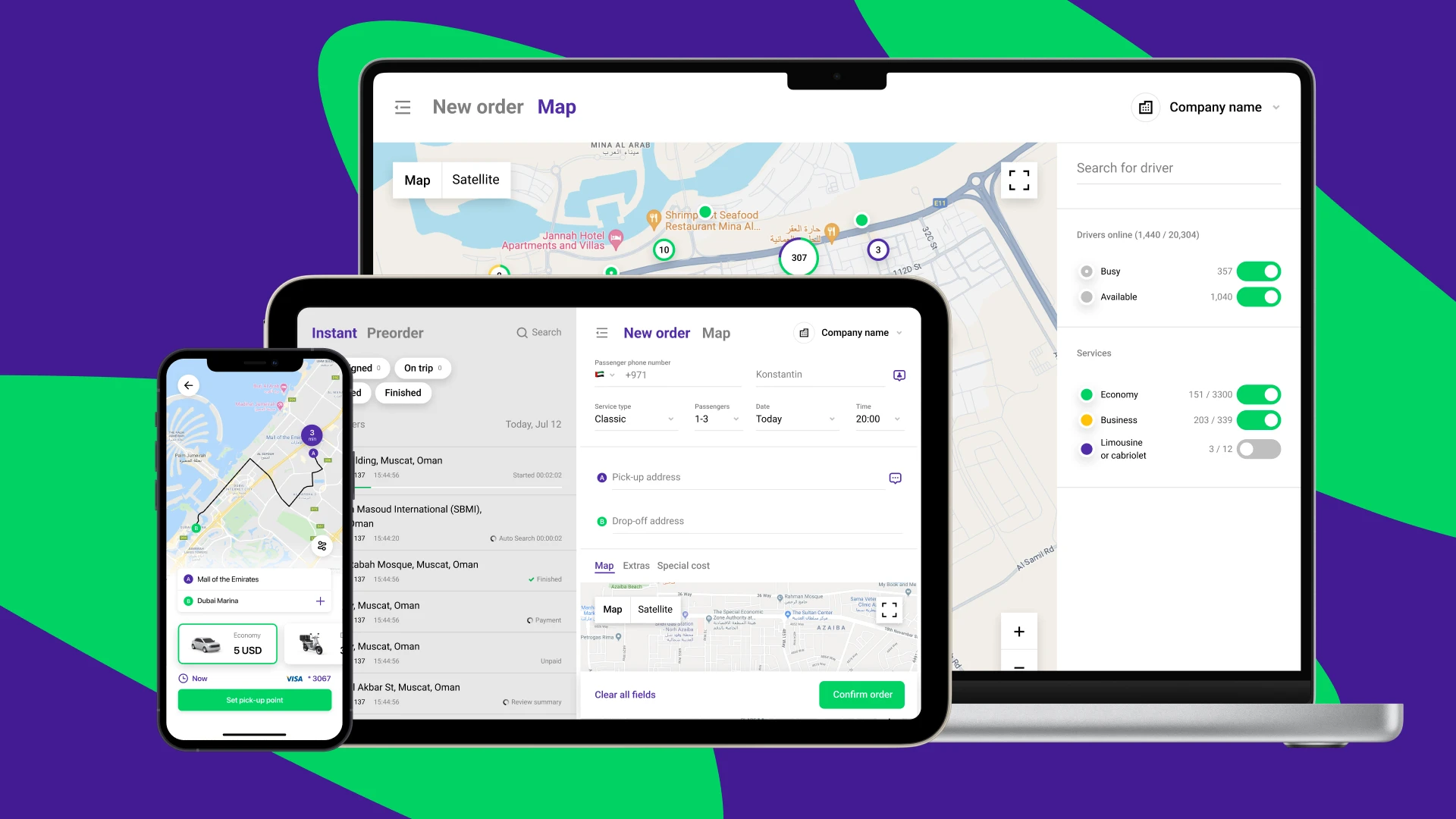
7 best ride-hailing сlone apps for small and mid-size taxi businesses
Here’s a curated list of the 7 best ride-hailing сlone apps for small and mid-size taxi businesses, chosen for their performance, features, affordability, and support for mobility services.
1. Onde (formerly TaxiStartup)
Best for: small and mid-sized companies looking for a SaaS-style turnkey ride-hailing solution
Onde is a cloud-native ride-hailing platform supporting up to 40+ service types (e.g., taxi, e-hailing, deliveries, bike courier, etc.). Built for millions of daily orders with 99.98% uptime, Onde offers white-label iOS, Android, and web apps that allow you to enter the market in weeks.
Highlighted features include:
- White-label branding: Fully tagged with logos/colors across for Customer and Driver apps
- Worldwide multilingual and map support: any language and accurate maps anywhere in the world
- Smart route order distribution: an intelligent algorithm to distribute orders between drivers and decrease idle time
- Flexible payments: supports cashless payments with multiple payment gateways and an in-app wallet
- Promotion in app stores for high rankings is included in all plans for free
- In-app promotions to boost user and driver retention
- Safety features, in-app chat, ratings & reviews for drivers and customers, referral programs
- Lifetime features updates and 24/7 support with a dedicated account manager
- AI performance analytics and reports
Pricing: One-time fee, then flexible monthly % revenue share, or fixed rate with no fleet size limits. No extra charges. Complete set of apps available in each plan, along with ASO, app branding, and launching in app stores.
What are the pros and cons of choosing Onde?
Pros: Choosing Onde reduces the risk of costly downtimes, helping protect your app’s reputation and revenue. You get the whole set of apps in the cheapest plan, including app promotion in stores, which is required for attracting users fast. Onde also lets you scale your business affordably, unlike per-ride or per-driver pricing models. No tech skills or developers required from your side. Possibility to add Delivery and turn your app into Super App with a 50% discount.
Cons: You won’t own the source code, and customization options are limited.

2. Gofer by Trioangle
Best for: small and mid-sized businesses looking for quick deployment and customization
Gofer, developed by Trioangle Technologies, is an Uber clone primarily for the taxi booking market. It is designed for swift deployment and customization, enabling entrepreneurs and businesses to launch their own on-demand transportation or service platforms with minimal lead time.
Essential features include:
- Native iOS & Android apps for Driver & Rider
- Real-time GPS tracking
- Fare estimation
- Multi-language/currency support
- Payment integration (only PayPal, Stripe, Cash and Braintree included)
- Performance report
Pricing: Full Stack Bundle costs $5,999 and includes 3 months of free support.
What are the pros and cons of choosing Gofer?
Pros: Gofer includes source code ownership and has a quick time-to-market.
Cons: Limited information on available features, stability, and data security. You also only get 3 months of support, and you may require an in-house developer and paid infrastructure support for scaling and maintenance after the first 3 months are over.
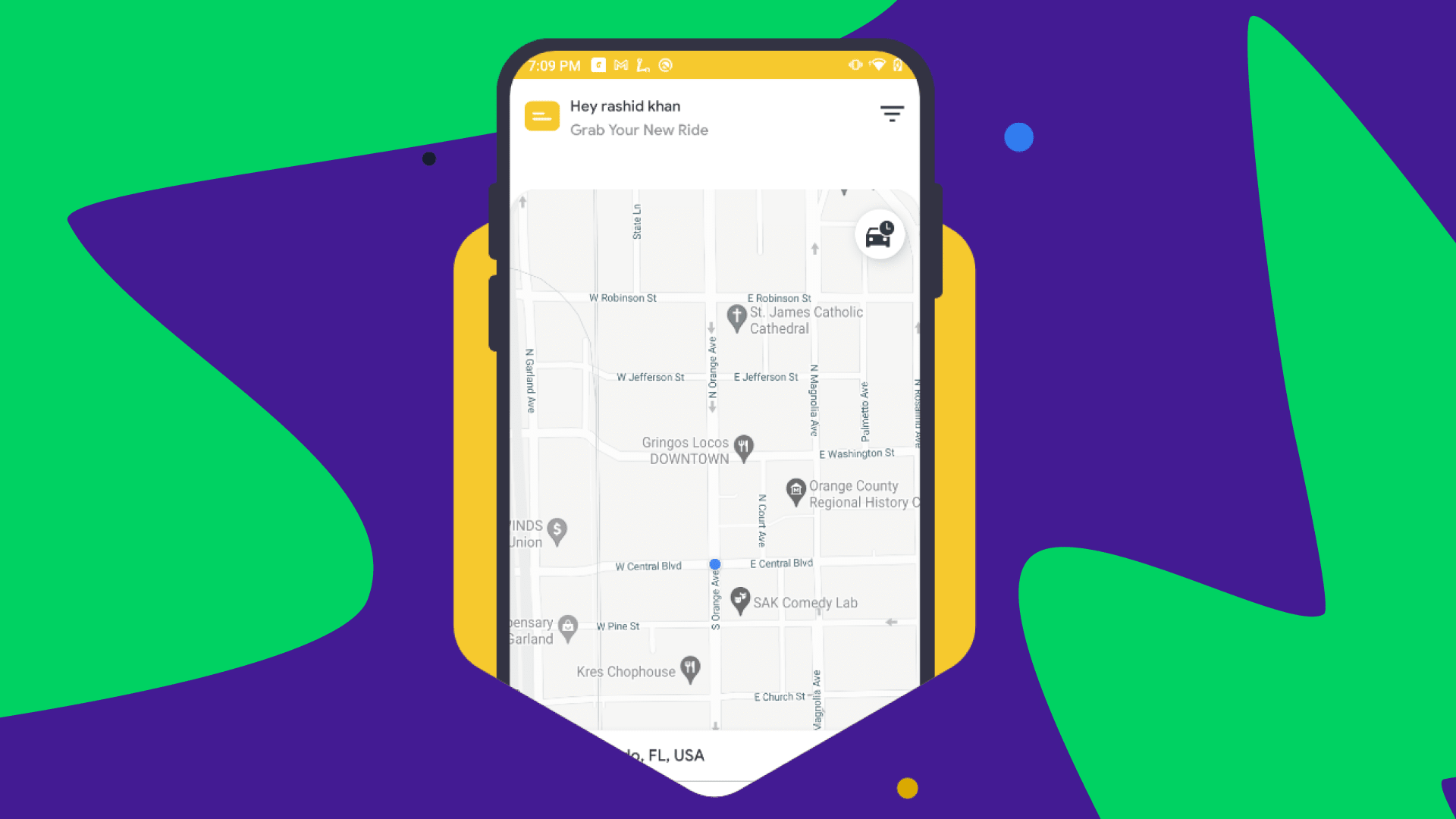
3. Jugnoo
Best for: starting new taxi businesses or digitizing existing fleets
Originally built for the Indian market, Jugnoo offers high usability and multilingual support. It is known for focusing on auto-rickshaw and taxi aggregation, affordability, and accessibility.
Platform benefits include:
- Real-time booking, fare estimates, and scheduling
- Multiple payment methods (cash, cards, digital wallets)
- Driver and ride rating, in-app support, promo codes
- Centralized dashboard for live trip and fleet management
- API access for integration with external services
Pricing: Jugnoo offers flexible pricing plans, with options for business size and ride volume. For each plan, you get a limited number of included rides and an extra cost per ride.
What are the pros and cons of choosing Jugnoo?
Pros: Jugnoo offers very affordable, flexible pricing to start a mobility business.
Cons: Per-ride pricing can become costly as your business scales. There is also a lack of advanced features for complex operations. Only essential features are available in apps from the start. For every additional Uber-like app feature, you will have to pay extra. There is also no information about the app's stability, as well as limited tech and account support.
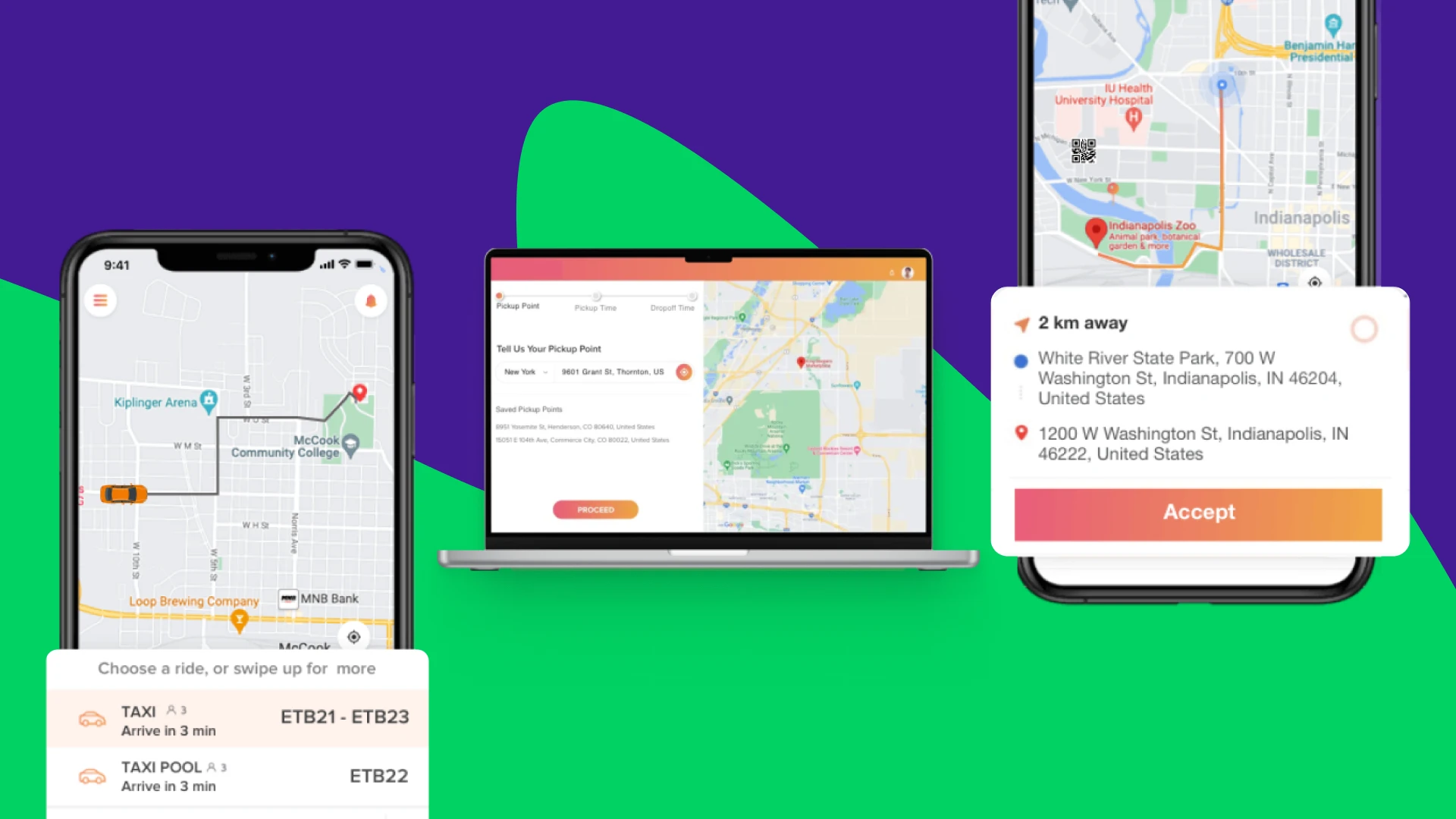
4. CabStartup
Best for: mid-sized passenger transport, delivery logistics, public transit, fleet-based businesses like NEMT, and other mobility companies.
CabStartup provides a broad transportation "super-app" suite including ride-hailing, logistics, shuttle, and corporate services.
Noteworthy features include:
- White-label iOS & Android apps for Driver & Rider
- Earnings reports & availability scheduling
- Dispatch panel with real-time GPS & VoIP
- Analytics dashboards: Route tracking, shuttle services, wallboards, merchant apps
Pricing: pricing starts at $4,999 for a setup and goes up to $44,999 for Enterprise. Features heavily depend on the plan.
What are the pros and cons of choosing CabStartup?
Pros: CabStartup is suitable for different markets and boasts an advanced dispatch panel
Cons: Users report scalability and reliability issues, and customer support and platform stability may vary. In cheaper plans, the number of drivers is limited: the basic plan supports up to 10 drivers. Payment gateway integration is an optional feature, available for an additional fee of $3,000. Pricing makes scaling very expensive.
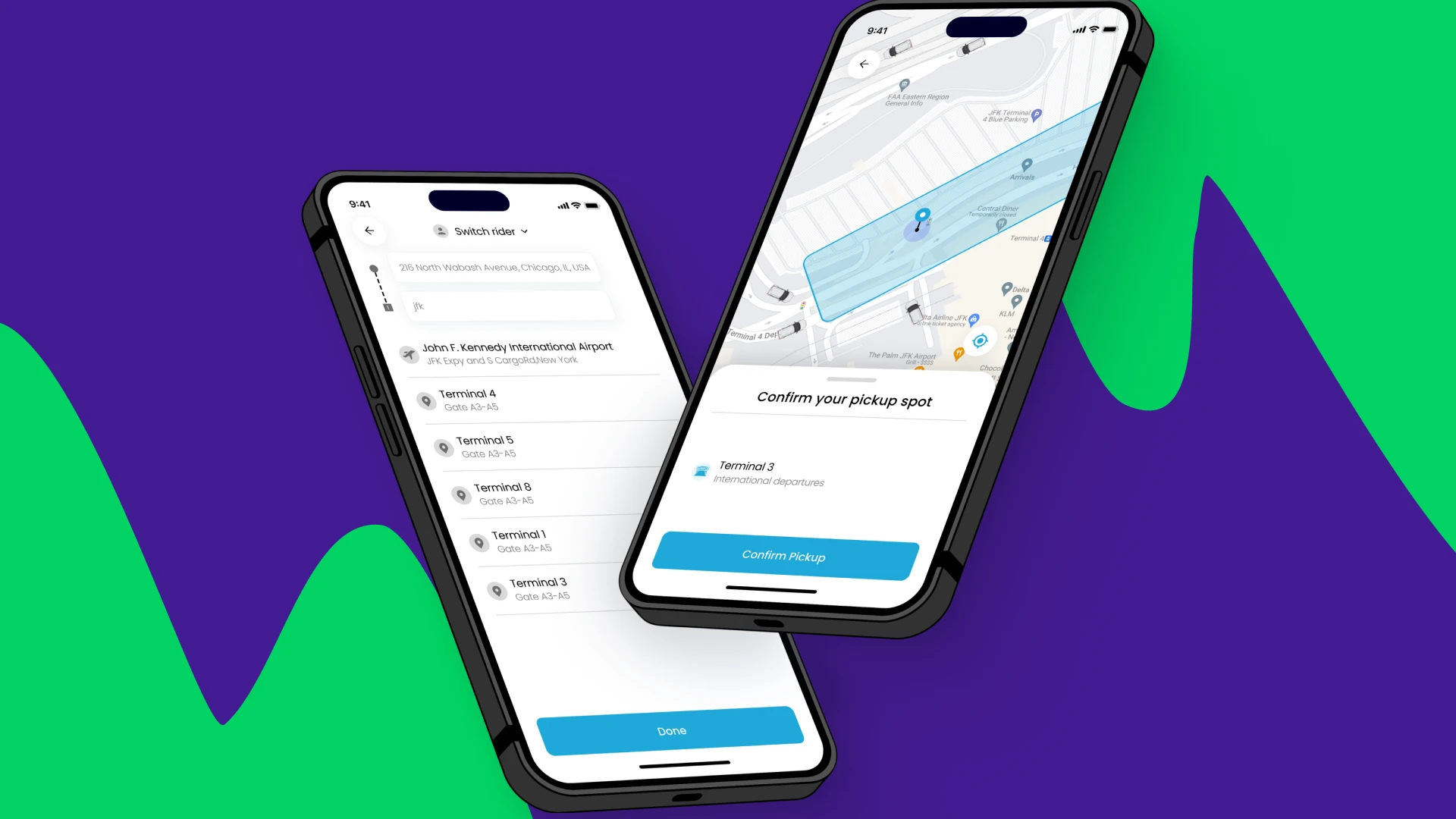
5. V3Cube
Best for: starting mobility businesses looking to test their on-demand service idea
V3Cube’s platform mirrors the Uber model, supporting city rides, rentals, and intercity travel. It allows multiple Uber clone options, such as Taxi Rides, Taxi Rental, Taxi Pool, Bid for Ride, Intercity taxis, etc. The company has been developing and delivering a ride-hailing app since 2016 and offers flexibility and customization.
Though official site data is limited, it includes:
- Hourly packages & scheduled rides for long-distance needs
- White-label iOS/Android apps ready to deploy
- Fast implementation with multilingual support for international markets
Pricing: Custom pricing is available and suited for businesses offering diverse ride formats and time-based billing.
What are the pros and cons of choosing V3Cube?
Pros: V3Cube supports a variety of ride types, which makes it a great choice for niche mobility services.
Cons: Scalability and reliability are limited, and customer support is lacking. As V3Cube is a custom app development company, many factors are unpredictable: the final cost of the solution, time-to-market for apps, the ongoing cost of feature maintenance and updates.
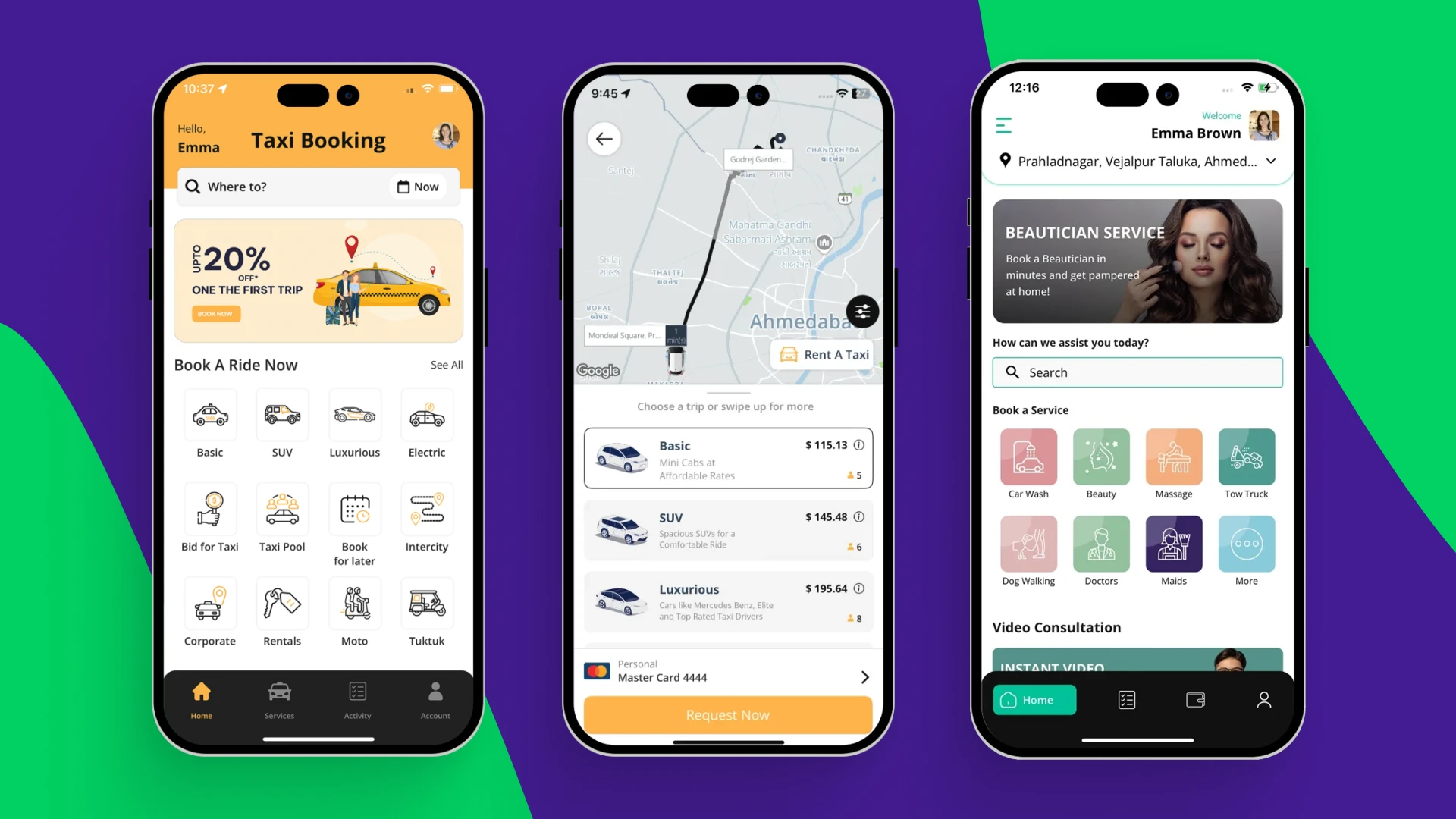
6. UnicoTaxi
Best for: small companies looking to automate their fleet-based business with a dispatch system
UnicoTaxi offers Uber-style ride-hailing apps for riders and drivers, an admin panel, and a dispatcher panel, all fully customizable under your brand and logo. The scope of essential features includes:
- Native iOS and Android apps for riders and drivers
- Live GPS tracking and navigation
- Surge pricing, fare calculations, and multiple vehicle types
- Multiple payment options: cash, card, wallets, and other digital payments
- Multi-language & multi-currency support
- Scheduling and instant booking
Pricing: Specific pricing is unavailable on the official website. It’s custom-quoted, depending on your feature set, platform choice, and customization needs.
What are the pros and cons of choosing UnicoTaxi?
Pros: UnicoTaxi offers customizable features and admin/dispatcher panels. You will get the complete ownership of the license-based Lyft clone app source code.
Cons: Your apps and panels may require developer support for feature updates, upgrades, or scaling. White-label apps and most ride-hailing features are only available at an additional price. So far, the apps only support the English language.
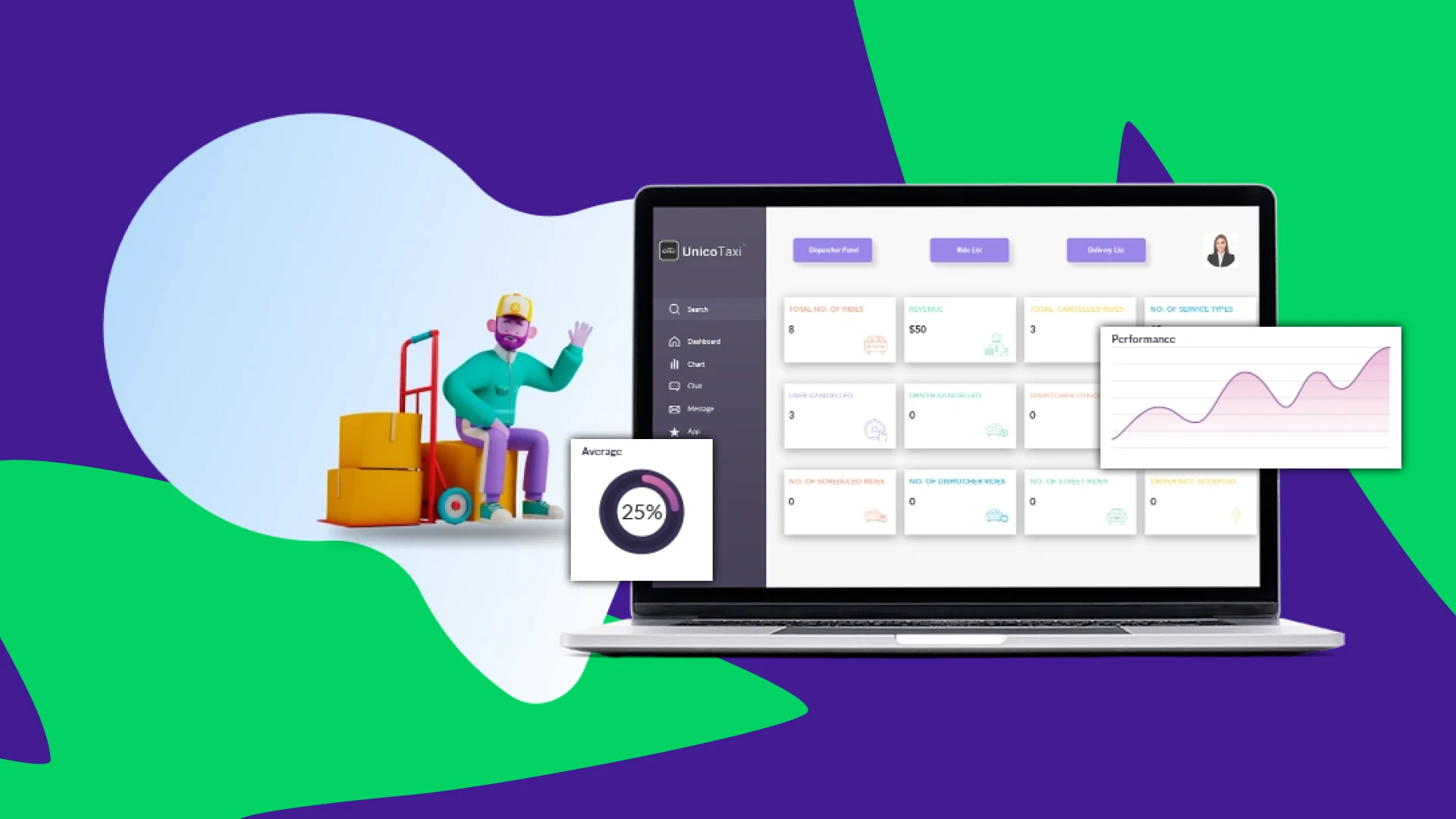
7. VivoCabs
Best for: VivoCabs offers a complete Uber clone app for small and medium-sized on-demand businesses that want to try working with mobile apps and have the resources to support the apps themselves or with their in-house developers. If the company already has hosting, the apps can be launched within 7–14 days.
It has all the essential features, including:
- White-label Rider and Driver apps
- Quick login and easy registration
- Ride bidding and vehicle selection
- Fare estimation and multiple payment options (cash, cards, in-app wallet)
- Driver verification and ratings
- Rental packages and ride-sharing options
Pricing: Starts from $3998 for Android and iOS apps with 1 year of tech support. All ongoing updates of both apps for an additional price.
What are the pros and cons of choosing VivoCabs?
Pros: VivoCabs offers bidding, ride-sharing, and rental packages tailored to these types of mobility businesses.
Cons: VivoCabs doesn’t provide source code access, there is limited customization and flexibility, and the service is less suitable for long-term innovation. The company purchasing VivoCabs should have tech resources and skills, including its own server.
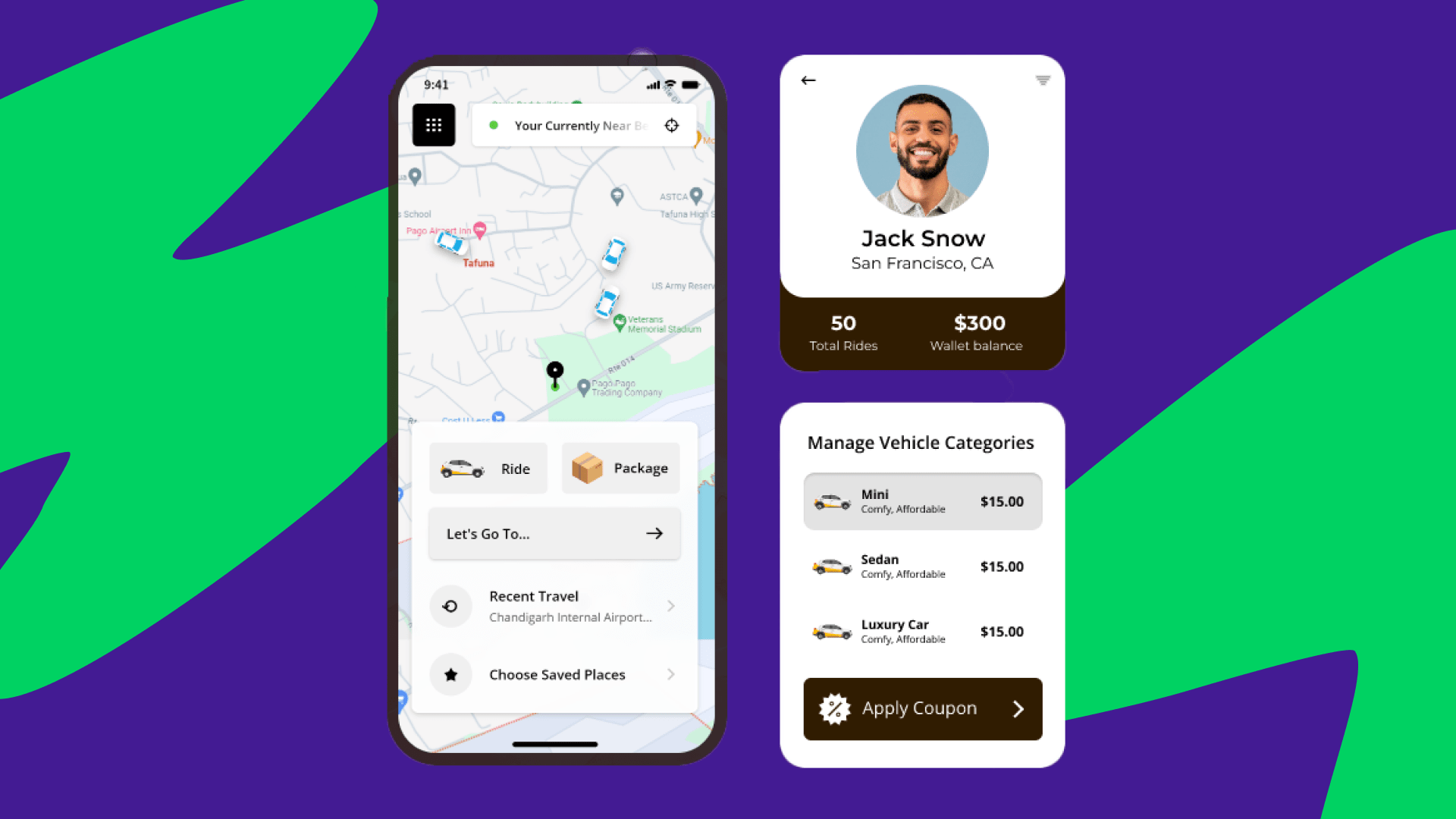
8. Mobisoft Infotech – Taxi Pulse
Best for: mid-sized businesses that require full customization
Mobisoft Infotech’s Taxi Pulse is an end-to-end customizable ride-hailing solution, ideal for businesses seeking a unique brand identity. It supports native iOS and Android apps for drivers, riders, and dispatchers, along with a customizable cloud backend.
Key features include:
- Real-time fleet tracking: GPS location for optimizing pickups and dispatch
- Multilingual support: Choose from popular global languages for rider and driver interface
- Carpooling & sharing: Includes ridesharing app development that allows passengers to share a ride with others
- White-label branding: Fully tagged with logos/colors across apps and management panels
Pricing: Pricing is quoted per project and depends on complexity. Usually, customized clone app solutions start from $20K–$50K.
What are the pros and cons of choosing Mobisoft Infotech?
Pros: Mobisoft is highly customizable and supports advanced features like carpooling.
Cons: High starting cost may be out of reach for small companies, and a much longer development and launch timeline is required. Additionally, this approach requires the client to have strong technical skills or a team of in-house developers.
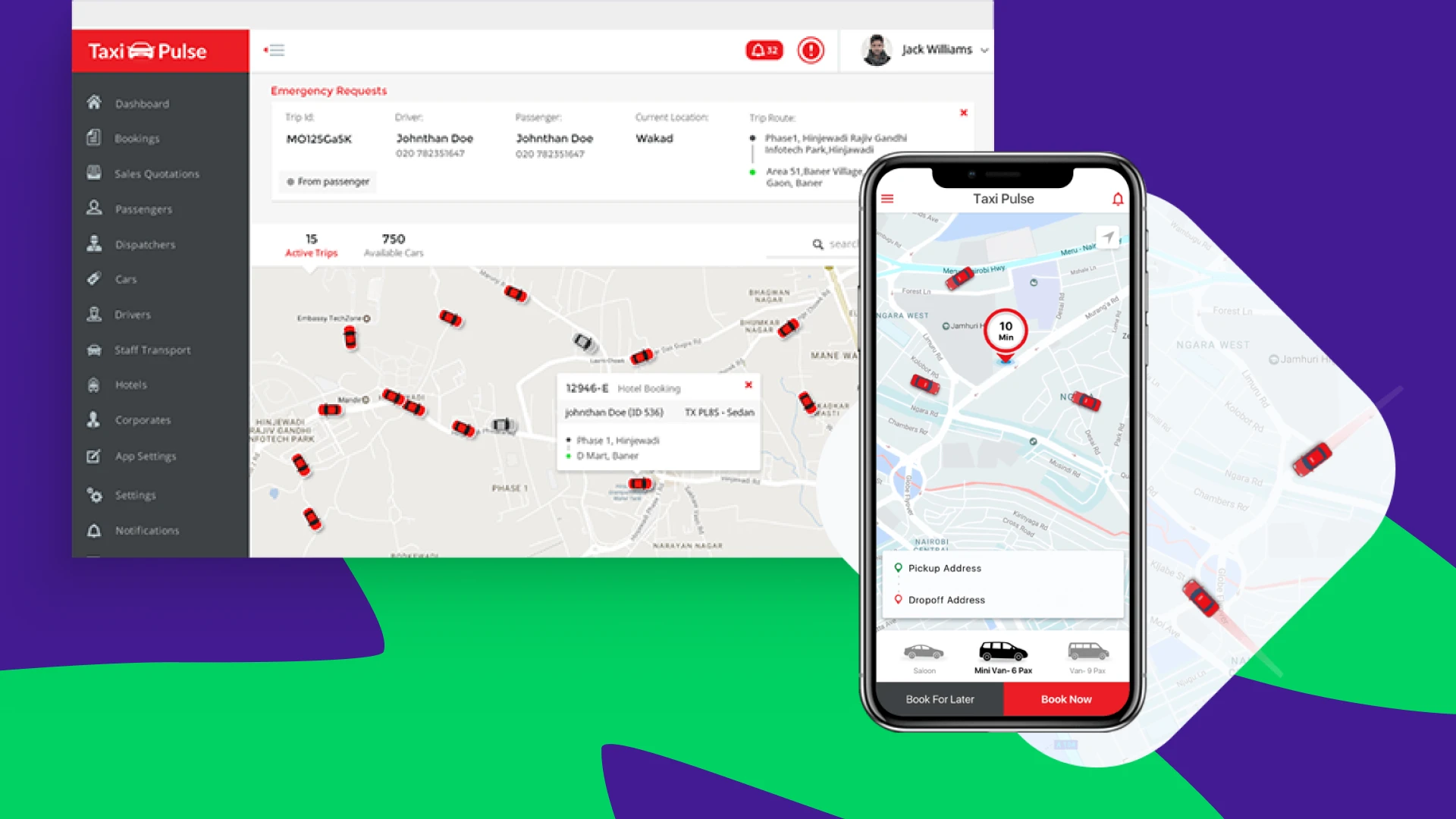
What to consider when choosing a ride-hailing platform?
1. Stability and reliability
If you're aiming for fast business growth, stability is key. You can't afford:
- missed bookings,
- delays in real-time location tracking for drivers and riders.
Look for platforms that guarantee uptime of at least 98%. If this information is publicly available on their website and you don’t see complaints about crashes or outages in third-party reviews, that's a great sign. If not, it’s a red flag.
2. Feature set that matches your business needs
Choose software that aligns with the specific features your business requires. You can use this guide to compare and evaluate platforms.
For example, if launching branded mobile apps is critical for you, make sure to choose a provider that includes this as a built-in feature for free.
3. Your willingness to handle technical aspects
Ask yourself if you are ready to deal with things like:
- hosting and maintaining the apps
- updating features
- managing backend infrastructure
If not, then you should look for a SaaS solution that handles all the technical operations for you.
4. Check recent reviews on trusted platforms
Before making a decision, look at recent and verified reviews on sites like:
Reviews often reveal real-world problems, such as app crashes, bugs, or poor customer support — issues that are not always visible in marketing materials.
5. Match your platform with your business goal
If your current goal is to grow your passenger base and ride volume, choose a provider that supports app store promotion and marketing services (Meta ads, Google Ads, etc.).
Clone apps vs ready-made SaaS platform (Onde)
| Taxi clone apps | Onde |
Time to launch | 3-5 weeks | 4 weeks |
Developer on your side required | ✅ | no |
Self-served hosting required | yes | no |
Hidden payments | ✅ | no |
Built-in payment gateways | for extra cost | ✅ |
Stability | unstable | 99.98% uptime |
App updates & maintenance | for extra cost | ✅ |
Apps’ branding | for extra cost | ✅ |
Backend built-in | no | ✅ |
Marketing assistance | for extra cost | ✅ |
App stores launch support | no | ✅ |
24/7 tech support | no | ✅ |
People Also Ask
Like the article? Share it with your friends!


